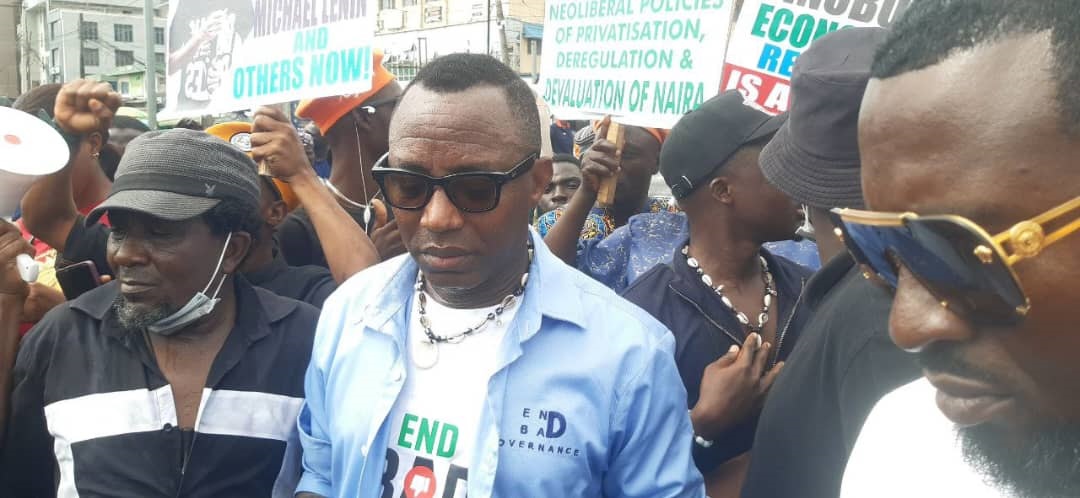At least 22 people, including prominent youth activists, were arrested on Sunday during a peaceful gathering at the Lekki Tollgate in Lagos to mark the fourth anniversary of the #EndSARS protests.
The gathering was held in memory of the lives lost during the October 20, 2020, shooting by soldiers, which occurred at the height of demonstrations against police brutality and the Special Anti-Robbery Squad (SARS).
The commemorative protest, intended as a peaceful reflection on the events of 2020, quickly escalated when police on the scene reportedly fired teargas and gunshots in an attempt to disperse the crowd.
Among those arrested was Hassan Taiwo Soweto, the national spokesman for the Youth Rights Campaign (YRC), as well as members of the #EndBadGovernance Movement.
Eyewitnesses reported that the protesters were bundled into a black maria and transported to the Criminal Investigation and Intelligence Department in Panti, Lagos.
READ ALSO: Explosions, protests erupt at Rivers LG Secretariats following police withdrawal
Human rights activist and former presidential candidate Omoyele Sowore, who confirmed the arrests via social media, condemned the government’s ongoing suppression of peaceful protests.
Sowore’s post on X (formerly Twitter) lambasted the Nigeria Police Force (NPF), questioning the rationale behind their aggressive tactics.
“The most senseless police force in the world. Why attack peaceful protesters? Did the NPF think they can use brute force to save Buhari, Tinubu, and Governor Sanwo-Olu for their role in the Lekki Toll Gate massacre? NEVER!” he wrote, referring to the political figures widely criticized for their handling of the 2020 massacre.
Experts in civil rights and governance have expressed concerns over the growing use of force against protesters in Nigeria.
Olisa Agbakoba, a constitutional lawyer and former president of the Nigerian Bar Association, said the incident reflects a worrying trend of diminishing space for civic expression. “The right to peaceful assembly is enshrined in Nigeria’s constitution.
Using force to disperse peaceful gatherings only exacerbates public distrust in government institutions and intensifies grievances, particularly among the youth,” Agbakoba said.
Similarly, Aisha Yesufu, a prominent activist who played a key role during the #EndSARS protests, condemned the arrests. “The repeated attempts by the government to stifle dissent only reinforce the idea that they are afraid of accountability.
READ ALSO: Oct. 1: Police guard protests in Lagos
These arrests are not just about silencing protestors today—they’re about rewriting the narrative of 2020 and preventing future generations from demanding justice,” she remarked.
This incident underscores the enduring tensions between Nigeria’s security forces and its youth, who continue to push for reforms in governance and policing.
Despite the disbandment of SARS in 2020, many protesters and human rights groups argue that systemic abuses and poor governance persist, leading to a deepening sense of frustration across the country.
With protests marking the anniversary of the #EndSARS movement regularly facing resistance, experts suggest that the government needs to embrace more democratic ways of addressing the public’s grievances rather than resorting to force.
The arrest of peaceful protestors, they argue, sends the wrong message about Nigeria’s commitment to human rights and democratic freedoms.
As the nation reflects on the fourth anniversary of the Lekki Tollgate shootings, civil society organizations continue to call for accountability and justice for those affected by police brutality, hoping that the voices calling for change will not be silenced.

 Entertainment1 week ago
Entertainment1 week ago
 Entertainment4 days ago
Entertainment4 days ago
 Comments and Issues1 week ago
Comments and Issues1 week ago
 Comments and Issues1 week ago
Comments and Issues1 week ago
 Business1 week ago
Business1 week ago
 Comments and Issues1 week ago
Comments and Issues1 week ago
 Health6 days ago
Health6 days ago
 Football6 days ago
Football6 days ago

